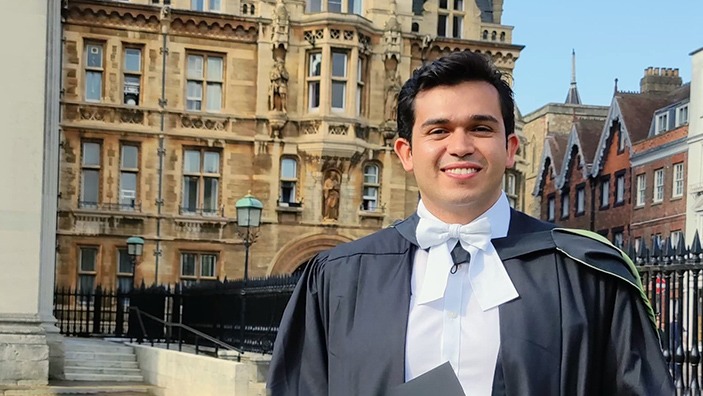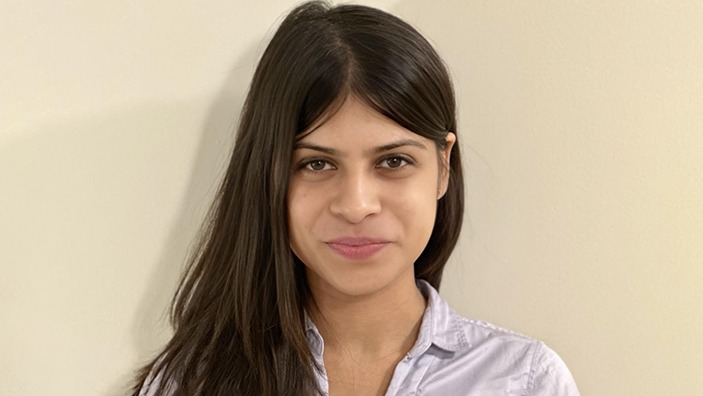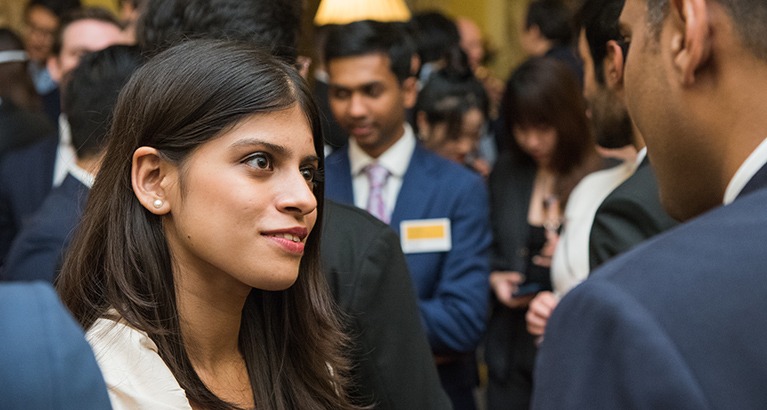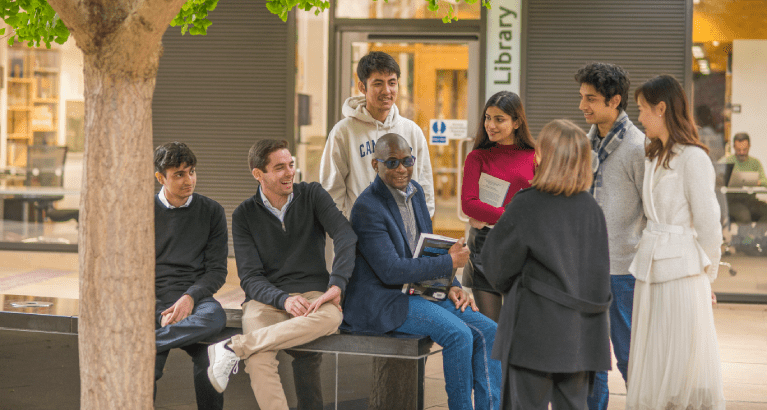Global uncertainty and ongoing economic instability made last year a challenging one for the jobs market, with big-name companies in the tech sector and beyond continuing to make staff cuts.
But despite the challenging environment, Cambridge MFin alumni made some impressive career moves. According to our latest Employment Report, 96% of the 2022/23 class achieved at least one career transition (changing job function, industry or country), while 48% made a switch in all 3.
Our alumni are now working in 13 different countries around the globe, with 87% having switched function (up from 74% the previous year), 67% joining a new employer, and 60% switching to a new location.
Switched function
Switched employers
Switched location
To find out more about how our alumni made their transitions, we spoke to two2 triple jumpers who graduated from Cambridge Judge Business School last year. Here they tell us about their individual journeys, their experience on the MFin, and how the programme helped them accelerate their careers.
Q&A with Sebastian Padilla

Project Finance Manager for Gransolar, SolarTeam & Itulpark, Ecuador (MFin 2022)
- Switched from: Finance Development in USA
- Switched to: Energy/Infrastructure Developer in Ecuador
Can you tell us a bit about your role in project finance?
As a project finance manager, I’m in charge of securing funding for projects in the infrastructure and energy space in Ecuador. I’m currently working on the development and financing of a solar power plant in the Galapagos Islands and a C&I solar platform. Before that, we successfully closed financing for a Logistics Park. This work involves the entire investment cycle from the sponsor side – from creating financial models and contacting lenders to negotiating legal documents and collating all the information ready for due diligence, and for supervision once the loans are disbursed.
Where were you working before the MFin, and what made you decide to return to Ecuador?
Before the programme, I was an investment associate at IDB Invest – the private sector branch of the Interamerican Development Bank, based in Washington DC. But I grew up in Ecuador, and after four years in the US and UK, I wanted to go back to my home country and work on transformational projects there.
During my MFin programme in 2023, I had a conversation with my current boss about a project called Conolophus that involves building a battery-run photovoltaic microgrid for the Galapagos Islands. Under a concession from the Ecuadorian Government, it’s set to transform the main island Santa Cruz by switching its energy supply from 95% fossil fuel to 70% solar photovoltaic energy. I was fascinated by the idea and drawn by the prospect of working with others who shared the same beliefs as me around conservation and love for nature.
What was your favourite thing about the MFin programme?
Alongside the University of Cambridge’s world-class reputation, Cambridge Judge Business School is one of only a few business schools that offer a post-experience (rather than just post-graduate) Master of Finance programme. This really drew me to Cambridge Judge, and it didn’t disappoint.
It was amazing being taught by professors who have long worked in the industry, and just having the chance to share thoughts and ask questions around day-to-day life in the sector was invaluable. I was surrounded by hard-working, ambitious individuals who really inspired me, and I also got the chance to spend spring and summer working with equity infrastructure teams at renowned institutions, which was instrumental in helping me to pivot from a banking position to where I wanted to be.
What practical experience did you gain on the programme?
The Group Consulting Project (GCP) was a key part of the programme. This involved working in a team with other classmates on a project with Corio Generation, a specialist offshore wind developer, and it provided me with invaluable experience.
During the summer, I also joined British International Investment (the government’s development finance arm) as an intern, working in their infrastructure equity team. The careers team at Cambridge Judge really helped me with the application process and connected me with alumni working for the institution. They also put me in touch with experienced investment managers in the field, so I was able to practice for the different interview rounds.
What tips do you have for current or prospective students considering a career in project finance or the wider renewable energy sector?
There are so many opportunities in the renewable energy industry across the globe, especially in developing countries, so I highly recommend looking into this area. If you’re interested in pursuing a career in the field, my top tip is to be curious about new technologies and financial modelling. You don’t need to be an expert from the start, but it’s important to invest time in learning, with the mindset that one day, with hard work and motivation, you will become one.
Q&A with Navnidhi Begwani

Business Intelligence Associate, AlixPartners (MFin 2022)
- Switched from: Professional Services; Financial Advisory in India
- Switched to: Consulting; Strategy in the UK
What does your current role in consulting involve?
I’m currently working with AlixPartners as an associate in consulting, where I work on projects that involve helping organisations, private equity clients and private equity-backed companies to improve performance through revenue growth, cost optimisation, digital implementation and other areas.
What really excites me about my role is the tangible impact I can have on businesses’ operations, and also the level of exposure to the industry – I get to work directly alongside senior sector experts who come with decades of experience.
How did you get the position?
I applied for the position after seeing it advertised on the company’s website. The careers team at Cambridge Judge were really helpful, providing materials to improve my CV alongside mock interview preparation and external consultants’ guidance. This helped me to strengthen my profile and get a 360-degree view of it during the whole application process.
Why did you decide to apply for the MFin and what were you doing prior to the programme?
Prior to joining the MFin, I was working for Deloitte’s forensics team in India, helping clients identify reputational and integrity risks as part of due diligence and pre-M&A advisory. I wanted to switch to consulting, so I decided to apply for the MFin to enhance my knowledge of operational and strategic finance and learn from a diverse, multi-cultural cohort.
How did the MFin help you to make the ‘triple jump’ to switch sector, function and country?
Through conversations with professors and guest lecturers on the programme, I gained a better understanding of the UK market. Being so close to London also gave me the chance to meet people from industry, further enhancing my knowledge of the sector before entering interview rounds. I was also able to tailor the programme itself to suit my aims, choosing electives around strategy and analysis in line with my career goals.
One of the other major assets was the access to the Business School’s alumni network and its close connection with the MBA cohort. Having access to the wider resources of the University, from social clubs to the entrepreneurship community, was also hugely beneficial. The College experience only added to it all, as I got to meet people from so many different disciplines.
Which areas in consulting are ripe for opportunity?
In the current market, there are significant opportunities in restructuring and turnaround, as well as in distressed credit and banking. To capitalise on these opportunities, I recommend developing programming skills, and honing your ability to analyse and interpret large data sets. Equally important are adaptability, flexibility and communication skills. Focusing on these elements can help accelerate your journey and help take your career to the next level.
The Cambridge Master of Finance (MFin)
Engage with the world’s best financial minds and skilled professionals. Open doors to exciting new career possibilities with a Cambridge Master of Finance.





